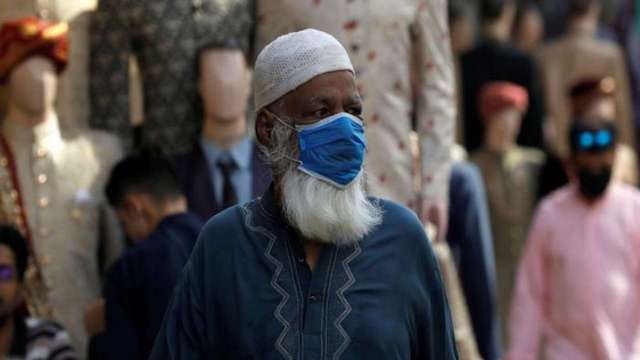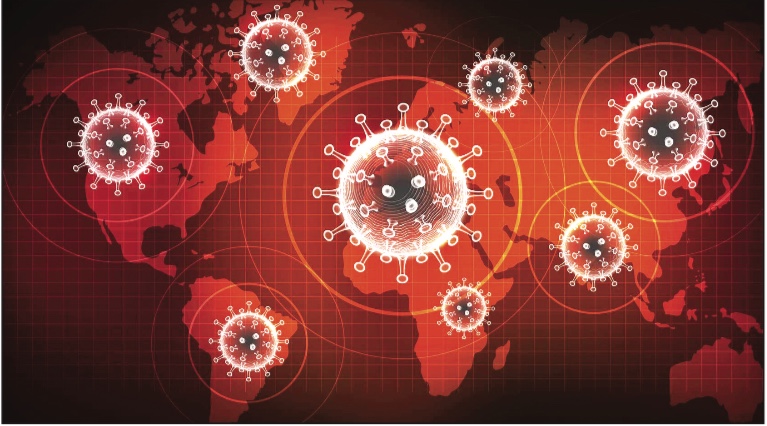The spread of the viral disease covid-19 internationally has been recognised as a global crisis under an international health emergency. The wave of this virus and its impact on the entire globe, without sparing a single country, has created an international environment of depression and anxiety. World leaders are active around the clock in investing their potential in an international corona-combating campaign. This global crisis has the potential to redefine the future of humanity by restricting nations on specific living standards. The pandemic’s potential of changing the conventional ways of human life has given rise to certain results where people all over the world will have to alter their traditional lifestyle in the post-corona age. A number of changed ways of normal human activities will create a physically distanced and digitally connected world for everyone. In other words, an international push towards a highly connected world in the cyberspace will create a world of digitized human existence instead of keeping different communities actually distanced and isolated. The digital infrastructures of the states will change the contemporary nature of the world by facilitating the people in the cyberspace.
A worldwide shift on cyber- space will go on to develop an international digital culture by converting the idea of citizens into netizens. Due to the information communication networks in the world, citizens will be forced to improve their living patterns with the help of internet. In this way, the new world of advanced communication channels will increase the use of hi-speed internet in the lives of the general public while converting the status of the citizens into the netizens. The concurrent use of the internet in multiple fields of life from online social interaction to online education parallel to online trading facilities to online political activities has increased the role of internet in the life of an individual. People are forced to rely on the internet for keeping their smooth lifestyles in the absence of physically interacting opportunities. Due to diminishing physical movements on various public places, state- governments created an industry wide focus on the internet which resulted in a high rate of Smartphone users. In reaction to this crisis, a large percentage of the population from different corners of the world decided to increase their reliance on online entertaining platforms in which different sectors of entertainment industry have improved their online services.
Witnessing from history the out- break of major incidents changed the nature of the international system by bringing significant modifications in the political landscape of the world. The global outreach of a crisis usually brings various fluctuations at the international level, and these fluctuations gradually become a truing point in the history of humankind. Analogous to other crises mainly consisting of out- break of world wars, signing of peace treaties, creating of greater alliances and the intra-state conflicts of revolutionary in nature, the rise of the pandemic at global level convinced the international com- munity that the world is going to change its traditional patterns. These changes in an international system of diverse political thoughts, varied economic systems and multifaceted social and cultural values will alter the conventional ways of managing inter-state relations. even the contradicting ideo- logical and religious differences between nations will also be affected due to the devastating impacts of the covid-19.

The spread of the novel-corona virus can further be comprehended through the historical lens because human history has experienced various pandemic cases. unsurprisingly, global pandemics have been experienced by the international community a number of times. The world has witnessed the rise of global viral diseases and their adverse impacts on the people. The universal vulnerability to the threats of pandemics has a long history and a culture of epidemic frequently caused various intercontinental suffering. The eruption of a universal health crisis due to the spread of Influenza, Typhus, Hemorrhagic fever, Smallpox, Bubonic, Hantavirus, Measles, Malaria, cholera and Yellow fever undermined the health standard of nations. Analogous to a long history of epidemics, the spread of the novel- corona virus has not only underestimated the crisis readiness of the state leaders, but it has also threatened the international system of globalized values. The emergence of an epidemic in the international system is a concern of all states because its devastating impacts upset the political, social and economical legal order of the nations.
The contemporary health disaster at a larger scale has become a truing point of modern history due to the demolition of the worldwide culture of healthiness. This situation has resulted in a loss of whole humanity and has forced the political authorities of different countries to take necessary measures to fight covid-19. As a result, global health officials developed a unique combination of control-controlling and corona-combating polices under a greater agenda of creating a corona-free world. An immediate measure to reduce further spread of the novel-corona virus was that main stream leaders of different nations preferred to adopt a policy of social distancing to keep the public physically separated from each other. In this way, an international environment of reduced human activities forced the governments to run the political, social and economic affairs of the states with the help of advanced sources of telecommunication. further efforts to overcome the destruction of the novel-corona virus are equated with the reduction of physical public interaction in society. In this way, a world of actually isolated but technologically connected societies has become an undeniable reality which has left mankind at the mercy of hi-tech communication networks.
The scenarios mentioned above cannot simply be ignored because the post-covid-19 world will fabricate a strategically different security environment. More dependence on the cyberspace will intensify an age of cybersecurity threats, and the insecurities of the states will be multiplied. The crisis of today will provide a new battleground to hostile countries and future clashes between governments will mainly be in cyber- space. The post-epidemic era will dislocate nations in the existing political order and will lead the governments towards a technologically supported virtual world. Apart from generating strategic competition in the cyberspace, the main patterns of global commerce will spread a digital web of trade wars between countries by deepening their virtual trading interactions. This environment will raise the probability of multiple malicious activates in the inter- state rivalries parallel to weakening the cyber walls of the nations. This situation will alter the traditional threat perceptions of the nations because the virtual world will bring digital threats for all states. The contemporary geopolitical designs of power politics will be faded out from the face of the earth, and it will be replaced with a virtual paradigm. A change in the outmoded political culture of the international system will adequately make aware the general public about the political developments of the world due to the rise of a new virtual paradigm.
An emergence of social media platforms will provide accurate and uncensored information to the general public along with empowering the political sentiments in the societies. The governments of the future will face a difficult task of keeping their strong influences over the people while appreciating their political loyalties of the general public. A free flow of information in the post-corona world will ensure error-free flow of information there- fore access to a hi-speed internet will be desirable. The fast communication networks will cut down distances with the help of different social media platforms, and the availability of virtual avenues to the general public will augment the ongoing forms of information war- fare. The technologically-supported societal arrangements will demand from governments the transparent economic dealings cemented in politically wise decisions. Through an intensive supply of different medical facilities, in addition to laying the foundations of the states in the cyberspace, will allow political leaders to curtail anti-state sentiments in the society smoothly. A society equipped with essential public political information equivalent to increased political participation of the citizen will strengthen the scope of virtually- controlled society, which will let the governments regulate various societal organs of the nation efficiently.
An emerging age of advanced political engagements of citizens in different continents will connect the people of different hostile societies through a telecommunication network, and a notion of digital democracy will reshape the states’ conventional ways of managing foreign relation. A virtual interconnectedness in the world will redefine the major cultural values because a persistently emerging dependency on the information technology will create a shared culture of a global society. Already the crisis of epidemic has gotten rid of the culture of upholding social values and respect through shaking and clasping hands. A common norm of keeping physical distance in society has dramatically diminished the custom of physical interactions across the globe. The promotion of a culture of digitally connected and socially isolated people has been accepted universally. In some parts of the world, governments have imposed the principle of carrying out social interaction without reducing a defined distance legislatively. In a few countries, the ruling governments started considering the socializing without defined precautionary measures a violation of societal laws. In this way, the novel-corona virus has apparently created physical gaps between people under an international corona-controlling campaign apart from facilitating the general public in the virtual world.

The prevention of normal human activities across the globe has restricted the regular patterns of life in cyberspace due to the spread of a viral disease. An unidentified source of this disease has created a global health emergency by posing a number of devastating impacts on nations. By disturbing the mainstream political, social and economic affairs of the states, the outbreak of pandemic from china and its global outreach has shaken the traditional foundations of the international system. An international beginning of extremely digital values has been accepted by the international community as an inescapable future of humanity because of an overwhelming wave of health emergency forced states to develop different technological infra- structures to continue their regular affairs of the states. This change has added another chapter in world history parallel to foreseeing a technologically improved future of mankind in which the significance of various means of telecommunication will be increased. The inter-state and intra-state affairs will start depending on the digital means of communications, and a worldwide wave of digitalization will create a common culture of hi-tech information communication networks.
An implementation of socially distanced and medically quarantining life will change the conventional societal setups of nations because the emerging health standards will lead the people towards a strong network of various communication networks. The physically separated people will develop strong communication channels through the internet, and the availability of hi-speed internet will become an undeniable demand of every society. Digital societal routines of nations will keep different communities across the globe more connected and less isolated. In the presence of limited visa activities to uphold a global culture of reduced physical human movements, the world will become a society of closely linked people with the help of widespread communication networks. The limited travel opportunities will compel people to shift their social and intellectual gatherings coupled with different political and financial activities on the cyberspace.
An international transition towards a digital economic system will bring a new world of highly advanced information communication networks. The digital solutions to conventional economic problems will produce a world of rapid trade activities along with generating a large number of financial opportunities. The technology will not be limited to maintaining of trade and investment dealings under the broader conception of digital finance. However, it will reduce the gap of physical interaction between seller and buyer and will further diminish different trading disparities between business communities, apart from providing a number of modern financial platforms to the people. This change in the post- corona world will bring in a new future of humanity because empowering nations in the digital domain will summarise the financial activities in the virtual world and the people around the world will avail equal trading opportunities. The spread of viral disease in every corner of the world will result in an intense virtual network of trading, and it will explore a new world of multiple business avenues.

The removal of different social activities under a broader frame-work of highly sensitive and physically distanced policy which introduced a new paradigm in the history of mankind, the digital world order will appear in future. Making a global shift towards a techno- logically advanced and mechanically developed world will replace the conventional ways of conducting normal business activities. An inevitable future in the form hitech international system will add another dimension in the list of various international disparities. A new world divided into two groups of people mainly based on connected and unconnected social classifications will create politics of technologically advanced and technologically deprived populations centres. The societal division based on people having appropriate access to hi-speed internet and people not having access and awareness to information communication networks in the cyberspace will disturb the nations. So, the availability of hi-speed internet connection coupled with the availability of digital devices and hi-tech gadgets will become an essential demand of the non-digital areas of the countries. An adequate access to a hi-speed internet connection and widespread availability to all populations centres will become a major problem for the state governments. Moreover, adequate awareness of the emerging wave of technologically advanced means of communication will become one of the major challenges to the states. Because of the situation, as mentioned earlier, digital learning has become an essential need of the time because the digital future of the world is no more a dream.
The ruling political parties will face a challenge of digital integration in the future due to an increasing level of dependency on cyber- space. The digital readiness of nations will communicate the technological strength of the nations in the world through an international culture of more coordinated and less isolated societies. The spread of large scale networks of information technology parallel to the worldwide spread of the viral dis- ease has changed the nature of contemporary social attributes. The technology will not be purely reserved for a particular domain of the state, and all the state affairs will be affected in the post-Covid- 19 world. furthermore, the politics of global health will leave a substantial impact on the emerging digital patterns in inter-state relations. In future, every nation will try to overcome its vulnerabilities in the health sector along with ensuring high health standards in society. The new world order in the aftermath of the novel-corona virus will try to generate the politics of health between hostile countries. Therefore, a world of new realities will emerge in the post-corona scenario and the politics of digital and non-digital areas of the world will formulate a virtual world of power politics.





